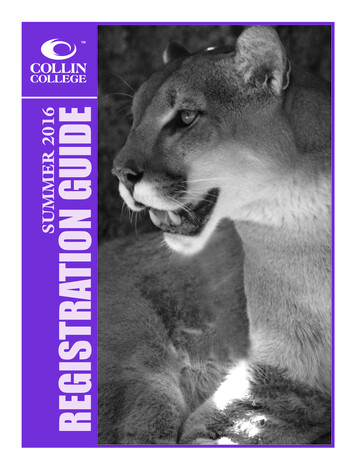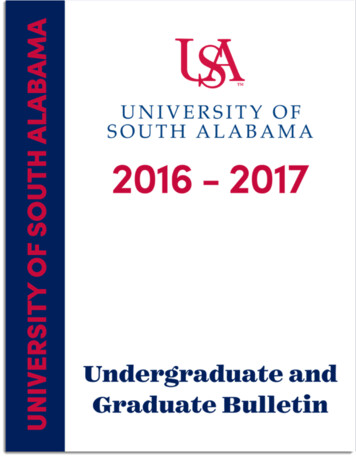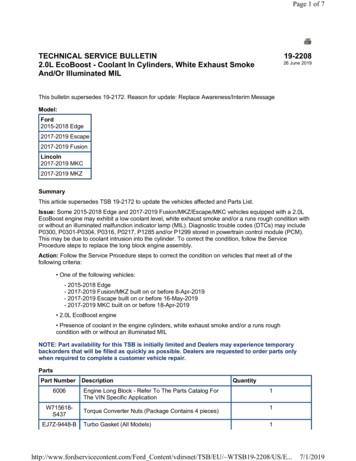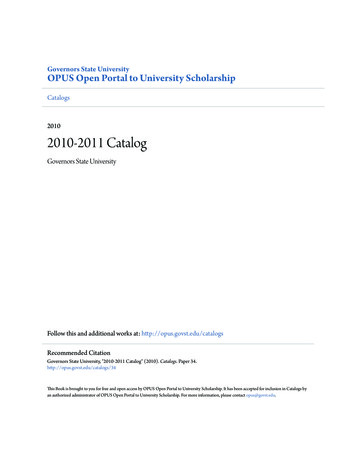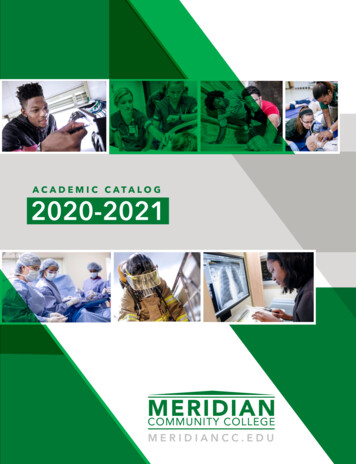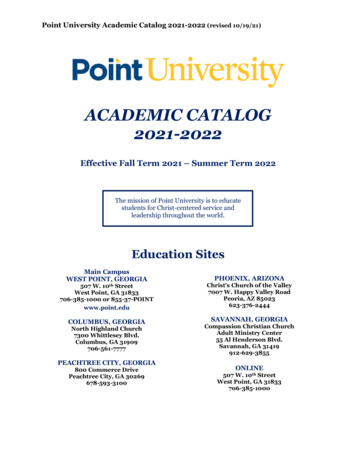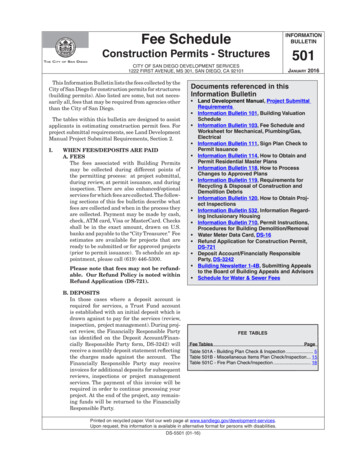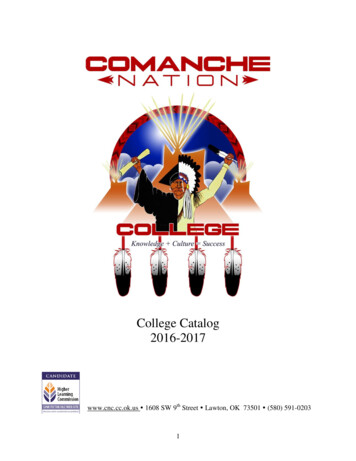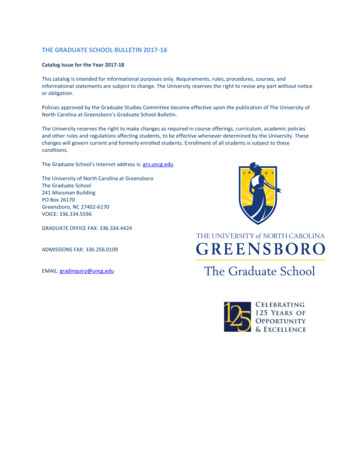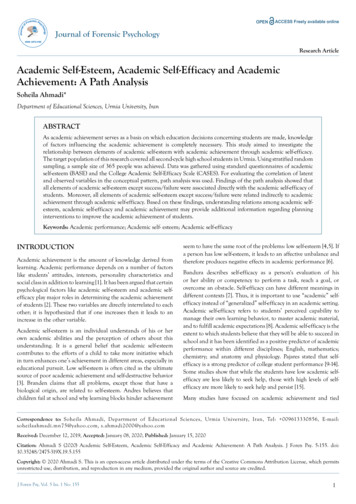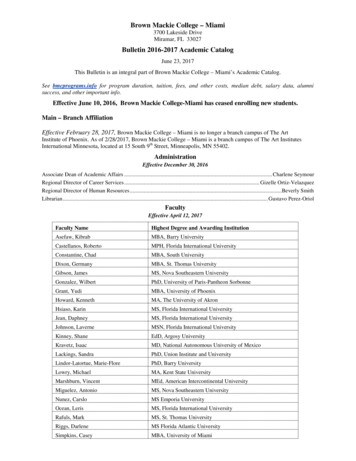
Transcription
Brown Mackie College – Miami3700 Lakeside DriveMiramar, FL 33027Bulletin 2016-2017 Academic CatalogJune 23, 2017This Bulletin is an integral part of Brown Mackie College – Miami’s Academic Catalog.See bmcprograms.info for program duration, tuition, fees, and other costs, median debt, salary data, alumnisuccess, and other important info.Effective June 10, 2016, Brown Mackie College-Miami has ceased enrolling new students.Main – Branch AffiliationEffective February 28, 2017, Brown Mackie College – Miami is no longer a branch campus of The ArtInstitute of Phoenix. As of 2/28/2017, Brown Mackie College – Miami is a branch campus of The Art InstitutesInternational Minnesota, located at 15 South 9th Street, Minneapolis, MN 55402.AdministrationEffective December 30, 2016Associate Dean of Academic Affairs . Charlene SeymourRegional Director of Career Services . Gizelle Ortiz-VelazquezRegional Director of Human Resources .Beverly SmithLibrarian . Gustavo Perez-OriolFacultyEffective April 12, 2017Faculty NameHighest Degree and Awarding InstitutionAsefaw, KibrabMBA, Barry UniversityCastellanos, RobertoMPH, Florida International UniversityConstantine, ChadMBA, South UniversityDixon, GermanyMBA, St. Thomas UniversityGibson, JamesMS, Nova Southeastern UniversityGonzalez, WilbertPhD, University of Paris-Pantheon SorbonneGrant, YudiMBA, University of PhoenixHoward, KennethMA, The University of AkronHsiaso, KarinMS, Florida International UniversityJean, DaphneyMS, Florida International UniversityJohnson, LaverneMSN, Florida International UniversityKinney, ShaneEdD, Argosy UniversityKravetz, IsaacMD, National Autonomous University of MexicoLackings, SandraPhD, Union Institute and UniversityLindor-Latortue, Marie-FlorePhD, Barry UniversityLowry, MichaelMA, Kent State UniversityMarshburn, VincentMEd, American Intercontinental UniversityMiguelez, AntonioMS, Nova Southeastern UniversityNunez, CarsloMS Emporia UniversityOcean, LerisMS, Florida International UniversityRafuls, MarkMS, St. Thomas UniversityRiggs, DarleneMS Florida Atlantic UniversitySimpkins, CaseyMBA, University of Miami
Tuition Rates & FeesEffective August 31, 2016Effective July 1, 2016, the charges for textbooks are identified as a separate charge. The total cost of the program is unchanged.ProgramCriminal Justice Specialist –DiplomaMedical Assistant – DiplomaMedical Insurance Specialist –DiplomaBiomedical EquipmentTechnology – Associate ofScienceBusiness Management Associate of SciencCriminal Justice - Associate ofScienceHealth Care Administration –Associate of ScienceInformation Technology –Associate of ScienceNursing – Associate of ScienceBusiness Administration –Bachelor of ScienceCriminal Justice – Bachelor ofScienceHealth Care Management –Bachelor of ScienceInformation Technology –Bachelor of ScienceProgramCredits/QuartersTuitionCredithourGen FeeCredithourTotalTuitionTotal GenFee*Total CostofTextbooksTuition CostofProgram**50/460/5 386 386 20 20 19,300 23,160 1,000 1,200 250 300 20,550 24,66050/4 386 20 19,300 1,000 250 20,55090/8 386 20 34,740 1,800 450 36,99090/8 386 20 34,740 1,800 450 36,99090/8 386 20 34,740 1,800 450 36,99090/8 386 20 34,740 1,800 450 36,99090/8112/9 386 405 20 30 34,740 45,360 1,800 3,360 450 560 36,990 49,280180/15 386 20 69,480 3,600 900 73,980180/15 386 20 69,480 3,600 900 73,980180/15 386 20 69,480 3,600 900 73,980180/15 386 20 69,480 3,600 900 73,980Students needing transitional courses will be charged the following in addition to the program costs listed above.SSE0050 Fundamentals of English . 1,664.00SSE0070 Fundamentals of Math. 1,664.00Tuition . 1,544.00Tuition . 1,544.00Fees. 100.00Fees . 100.00Textbook . 20.00Textbook . 20.00Please visit our Student Consumer Information page to find the average time to completion for continuously enrolled students for eachcredential level offered. This data is available at the average credit load, full-time or at full load. Changing programs, beginningprograms at the mid-term start date, taking remedial courses, taking time off from coursework, registering for fewer hours orunsuccessful attempts at course completion will increase the total length of the program and overall cost of education from what isdisclosed. Transfer credits awarded toward your program will likely decrease the overall length and cost of education.Textbooks: Textbooks (Digital or Traditional) will be noted in the registration material and will be charged in addition to tuition unlessthe student chooses to opt out. Students who do not opt out will not need to purchase textbooks. The purchase of the Digital Textbook isnot refundable. Students who do opt out will be responsible for purchasing the required textbooks and will be issued a 20.00 credit percourse on their student account for the student cost of the Digital or Traditional Textbook included in the course, excluding duplicateDigital or Traditional Textbooks used by other courses in the program.Technology Fee (optional): 650.00 (Taxes included). An institutional charge. Textbooks will be delivered in digital form and require atechnology kit which can be included in enrollment at the choice of student. In cases where a textbook is not available in digital form, aphysical textbook will be available from the College.Transcript Fee: 5.00 per copy. Applies to costs of printing and certifying official transcripts.Instructional material costs will vary by program.A payment plan may be arranged at the time of enrollment. Monthly payments are due as agreed on the payment of schedule of thestudent’s installment note. Payments may be made by money order, check, VISA, MasterCard, or cash.
If payment is not made on the due date, the student may be suspended from class until the payment is made. No grade reports ortranscripts will be issued to a student with a past due account.*General Fee applies to cost of institutional activities and services.**The displayed tuition cost of program is reduced by the credit hours successfully transferred into your program of study, either froman outside institution or from a previous enrollment, and assumes you pass all program courses as you attempt them. Tuition cost ofprogram includes tuition and general fees. Tuition and fees are subject to increases.Effective July 1, 2016Provision for Books and SuppliesAs described below, by the seventh (7th) day of each course start date within the payment period, the College willprovide students the following method to obtain the books and supplies required for their courses in the payment period. For courses that do not use Digital Textbooks - Pick up books and supplies directly from the College, andcharged to the student account. For courses using a Digital Textbook - An Electronic Textbook provided by the College to be redeemed withthe College’s contracted third-party vendor, and charged to the student account. For newly enrolled students - A technology kit consisting of an Apple iPad purchased from the College toreceive access to books on-line through Digital Textbooks, and charged to the student account.Title IV funding, if the student is eligible, will be used to pay for these charges. Any books and supplies charges inexcess of Title IV and other financial aid funding available on the student account are the responsibility of the student.If the student opts out of the College’s method for the Traditional Textbook or Electronic Textbook provided by theCollege as outlined above, the charge will be reversed on the student account by the end of week two (2) for the courseand the student is responsible for purchasing the required textbooks for her or his courses.A detailed listing of charges is disclosed on the College’s Enrollment Agreement and in the Catalog, or a supplementaldisclosure.If the student opts out of the College’s method, s/he will receive any Title IV credit balance, if one is created for thepayment period in question, no later than fourteen (14) calendar days after the first day of class or fourteen (14) calendardays of the date the Title IV credit balance appears on the student account. If a Title IV credit balance is not created and,therefore, the student is not due to receive one, s/he is responsible for purchasing the required books and supplies for heror his courses.The student may request a modification for a subsequent payment period regarding her or his choice to use theCollege’s method to obtain books and supplies at any time, but not retroactively, by contacting the Student FinancialServices or Student Accounting Department.Apple, the Apple logo and iPad are trademarks of Apple Inc., registered in the U.S. and other countries.
2017 Academic CalendarRevised September 15, 2016Winter Quarterly Recess – December 26, 2016 – January 2, 2017WINTER QUARTERJanuaryClasses BeginMartin Luther King, Jr. Day RecessFinal ExaminationsClasses EndTuesday January3Monday January 16Week of January 22Saturday January 28FebruaryClasses BeginPresident’s Day RecessFinal ExaminationsClasses EndMonday January 30Friday February 17Week of February 19Saturday February 25MarchClasses BeginFinal ExaminationsClasses EndMonday February 27Week of March 19Saturday March 25Spring Quarterly Recess – March 27, 2017 – March 31, 2017SPRING QUARTERAprilClasses BeginGood Friday RecessFinal ExaminationsClasses EndMonday April 3Friday April 14Week of April 23Saturday April 29MayClasses BeginFinal ExaminationsClasses EndMonday May 1Week of May 21Saturday May 27JuneMemorial Day RecessClasses BeginFinal ExaminationsClasses EndMonday May 29Tuesday May 30Week of June 18Saturday June 24Summer Quarterly Recess – June 26, 2017– June 30, 2017SUMMER QUARTERJulyClasses BeginIndependence Day RecessFinal ExaminationsClasses EndMonday July 3Tuesday July 4Week of July 23Saturday July 29AugustClasses BeginFinal ExaminationsClasses EndMonday July 31Week of August 20Saturday August 26SeptemberClasses BeginLabor Day RecessFinal ExaminationsClasses EndMonday August 28Monday September 4Week of September 17Saturday September 23
Fall Quarterly Recess – September 25, 2017 – September 29, 2017FALL QUARTEROctoberClasses BeginFinal ExaminationsClasses EndNovemberClasses BeginVeteran’s Day RecessFinal ExaminationsClasses EndDecemberClasses BeginFinal ExaminationsClasses EndMonday October 2Week of October 22Saturday October 28Monday October 30Friday November 10Week of November 19Wednesday November 22Monday November 27Week of December 17Saturday December 23Winter Quarterly Recess – December 25, 2017 – January 1, 2018In those months in which class meetings are lost to holidays, additional instructional time may be scheduled in order tomake up the contact hours as required.
Effective March 1, 2016: The following replaces the General Admissions policy found on page 5 of the College’sAcademic Catalog.General Admissions RequirementsEach applicant for admission is assigned a Student Success Coordinator who directs the applicant through the steps ofthe admissions process, providing information on curriculum, policies, procedures, and services, and assisting theapplicant in setting necessary appointments and interviews. To be considered for admissions to the College, a candidatemust be a high school graduate or hold a General Education Development (GED) Certificate.As part of the admissions process applicants must sign a document attesting to graduation or completion and containingthe information to obtain verification of such. Official high school transcripts or official documentation of high schoolgraduation equivalency must be obtained within the first financial aid payment period or the student will be withdrawnfrom the institution following established guidelines for withdrawn students noted in the catalog. Title IV aid will not bedispersed until verification of graduation or completion has been received by the College.Students seeking entry into the College with a high school diploma completed in a foreign country must provide anoriginal U.S. – equivalency evaluation from an evaluating agency which is a member of the National Association ofCredential Evaluation Services (NACES) (http://www.naces.org/) or the Association of International CredentialEvaluators, Inc. (AICES) (http://www.aice-eval.org/). The cost of evaluating the foreign transcript is borne by theapplicant.All transcripts or other documentation related to graduation or completion becomes the property of the College.Admission to the College is based upon the applicant’s meeting the above requirements, a review of the applicant’sprevious educational records, and a review of the applicant’s career interests. If previous academic records indicate thatthe College’s education and training would not benefit the applicant, the College reserves the right to advise theapplicant not to enroll.In addition, applicants seeking enrollment must obtain the following minimum score on the College’s academicreadiness assessment in order to be accepted*: Reading – 31Results of the academic readiness assessment will also be used to determine placement in transitional courses in Englishand/or math. See Initial Academic Assessment section of this catalog.Prior college transfer credit for composition and/or math courses will be disallowed if the academic readinessassessment threshold determines that a student needs to take transitional courses at the College.*Applicants holding an earned associate or higher degree from a college or university accredited by an agencyrecognized by the U.S. Department of Education or the Council for Higher Education Accreditation (CHEA) are exemptfrom the academic assessment minimum score requirement. In addition, applicants seeking enrollment into theAssociate of Science in Nursing program are exempt from the academic assessment minimum score requirement, pleasesee Program Specific Admissions Requirements.
Effective March 1, 2016: The following replaces the Initial Academic Assessment policy found on page 9 of theCollege’s Academic Catalog.Initial Academic AssessmentStudents are given an assessment of academic skills, commonly referred to as the academic readiness assessment. Theresults of the assessment provide the College with a means of determining the need for academic support throughtransitional studies courses and academic advisement. Because of the purposes of this assessment, students are advisedto perform to the best of their abilities to accurately reflect the need or not for additional academic support.The following minimum assessment scores must be achieved; otherwise, the student will be scheduled for transitionalcourse(s) : Writing – 83Reading – 75Mathematics - 100As soon as practical after the completion of the assessment, students are advised to meet with their Campus AcademicAffairs office and review their performance and the plan for additional academic support toward success.Effective June 21, 2016: The following replaces the Florida’s Statewide Course Numbering System (SCNS) policyfound on page 12 of the College’s Academic Catalog.Florida’s Statewide Course Numbering SystemCourses in this catalog have been reviewed and approved through the Florida Department of Education for participationin the Florida Statewide Course Numbering System (SCNS). This numbering system is used by all publicpostsecondary institutions in Florida and by participating nonpublic institutions. The major purpose of this system is tofacilitate the transfer of courses between participating institutions. Students and administrators can use the online SCNSto obtain course descriptions and specific information about course transfer between participating Florida institutions.This information is at the SCNS website at http://scns.fldoe.org.Each participating institution controls the title, credit, and content of its own courses and recommends the first digit ofthe course number to indicate the level at which students normally take the course. Course prefixes and the last threedigits of the course numbers are assigned by members of faculty discipline committees appointed for that purpose by theFlorida Department of Education in Tallahassee. Individuals nominated to serve on these committees are selected tomaintain a representative balance as to type of institution and discipline field or specialization.The course prefix and each digit in the course number have a meaning in the SCNS. The listing of prefixes andassociated courses is referred to as the “SCNS taxonomy.” Descriptions of the content of courses are referred to as“statewide course profiles.”Example of Course IdentifierPrefixENCLevel CodeCentury DigitDecade DigitUnit Digit(first digit)(second digit)(third digit)(fourth digit)1EnglishLower (Freshman)CompositionLevel at sitionSkillsFreshmanCompositionSkills ILab CodeNo laboratorycomponent inthis courseGeneral Rule for Course EquivalenciesEquivalent courses at different institutions are identified by the same prefixes and same last three digits of the coursenumber and are guaranteed to be transferable between participating institutions that offer the course, with a fewexceptions, as listed below in Exceptions to the General Rule for Equivalency.For example, a freshman composition skills course is offered by 84 different public and nonpublic postsecondaryinstitutions. Each institution uses “ENC 101” to identify its freshman composition skills course. The level code is the
first digit and represents the year in which students normally take the course at a specific institution. In the SCNStaxonomy, “ENC” means “English Composition,” the century digit “1” represents “Freshman Composition,” the decadedigit “0” represents “Freshman Composition Skills,” and the unit digit “1” represents “Freshman Composition Skills I.”In the sciences and certain other areas, a “C” or “L” after the course number is known as a lab indicator. The “C”represents a combined lecture and laboratory course that meets in the same place at the same time. The “L” represents alaboratory course or the laboratory part of a course that has the same prefix and course number but meets at a differenttime or place.Transfer of any successfully completed course from one participating institution to another is guaranteed in cases wherethe course to be transferred is equivalent to one offered by the receiving institution. Equivalencies are established bythe same prefix and last three digits and comparable faculty credentials at both institutions. For example, ENC 1101 isoffered at a community college. The same course is offered at a state university as ENC 2101. A student who hassuccessfully completed ENC 1101 at a Florida College System institution is guaranteed to receive transfer credit forENC 2101 at the state university if the student transfers. The student cannot be required to take ENC 2101 again sinceENC 1101 is equivalent to ENC 2101. Transfer credit must be awarded for successfully completed equivalent coursesand used by the receiving institution to determine satisfaction of requirements by transfer students on the same basis ascredit awarded to the native students. It is the prerogative of the receiving institution, however, to offer transfer creditfor courses successfully completed that have not been designated as equivalent. NOTE: Credit generated at institutionson the quarter-term system may not transfer the equivalent number of credits to institutions on the semester-termsystem. For example, 4.0 quarter hours often transfers as 2.67 semester hours.The Course PrefixThe course prefix is a three-letter designator for a major division of an academic discipline, subject matter area, orsubcategory of knowledge. The prefix is not intended to identify the department in which a course is offered. Rather,the content of a course determines the assigned prefix to identify the course.Authority for Acceptance of Equivalent CoursesSection 1007.24(7), Florida Statutes, states:Any student who transfers among postsecondary institutions that are fully accredited by a regional or nationalaccrediting agency recognized by the United States Department of Education and that participate in the statewide coursenumbering system shall be awarded credit by the receiving institution for courses satisfactorily completed by the studentat the previous institutions. Credit shall be awarded if the courses are judged by the appropriate statewide coursenumbering system faculty committees representing school districts, public postsecondary educational institutions, andparticipating nonpublic postsecondary educational institutions to be academically equivalent to courses offered at thereceiving institution, including equivalency of faculty credentials, regardless of the public or nonpublic control of theprevious institution. The Department of Education shall ensure that credits to be accepted by a receiving institution aregenerated in courses for which the faculty possess credentials that are comparable to those required by the accreditingassociation of the receiving institution. The award of credit may be limited to courses that are entered in the statewidecourse numbering system. Credits awarded pursuant to this subsection shall satisfy institutional requirements on thesame basis as credits awarded to native students.Exceptions to the General Rule for EquivalencySince the initial implementation of the SCNS, specific disciplines or types of courses have been excepted from theguarantee of transfer for equivalent courses. These include courses that must be evaluated individually or courses inwhich the student must be evaluated for mastery of skill and technique. The following courses are exceptions to thegeneral rule for course equivalencies and may not transfer. Transferability is at the discretion of the receivinginstitution.A. Courses not offered by the receiving institution.B. For courses at nonregionally accredited institutions, courses offered prior to the established transfer date of thecourse in question.
C. Courses in the 900-999 series are not automatically transferable, and must be evaluated individually. Theseinclude such courses as Special Topics, Internships, Apprenticeships, Practica, Study Abroad, Theses, andDissertations.D. Applied academics for adult education courses.E. Graduate courses.F. Internships, apprenticeships, practica, clinical experiences, and study abroad courses with numbers other thanthose ranging from 900-999.G. Applied courses in the performing arts (Art, Dance, Interior Design, Music, and Theatre) and skills courses inCriminal Justice (academy certificate courses) are not guaranteed as transferable. These courses need evidenceof achievement (e.g., portfolio, audition, interview, etc.).Courses at Nonregionally Accredited InstitutionsThe SCNS makes available on its home page (http://scns.fldoe.org) a report entitled “Courses at NonregionallyAccredited Institutions” that contains a comprehensive listing of all nonpublic institution courses in the SCNSinventory, as well as each course’s transfer level and transfer effective date. This report is updated monthly.Questions about the SCNS and appeals regarding course credit transfer decisions should be directed to the AssociateDean of Academic Affairs, Brown Mackie College - Miami, 1501 Biscayne Blvd. Miami, FL 33132, 305-341-6600 orto the Florida Department of Education, Office of Articulation, 1401 Turlington Building, Tallahassee, Florida 323990400. Special reports and technical information may be requested by calling the SCNS office at (850) 245-0427 orat http://scns.fldoe.org.Effective June 21, 2016: The following is in addition to the U.S. Departments of Veterans Affairs and DefenseEducation Benefits section found on page 62 of the College’s Academic Catalog.U.S. Departments of Veterans Affairs and Defense Education BenefitsFor students using Veterans Affairs (VA) education benefits, any complaint against the school should be routed throughtheVAGIBill FeedbackSystembygoingtothefollowingwebsite: http://www.benefits.va.gov/GIBILL/Feedback.asp. The VA will then follow up through the appropriatechannels to investigate the complaint and resolve it satisfactorily.GI Bill is a registered trademark of the U.S. Department of Veterans Affairs (VA). More information about alU.S.governmentWebsiteat http://www.benefits.va.gov/GIBILL/Trademark Terms of Use.asp.Effective June 21, 2016: The following is an addition to the Certification and Licensure Program SpecificInformation section found on page 65 of the College’s Academic Catalog.Certification and LicensureProgram Specific InformationBusiness nts in the Business Administration (BS)/Business Management (AS) programs who have successfully completedthe project management courses within the program curriculum are eligible to take the Certified Associate in ProjectManagement (CAPM) certification exam offered through the Project Management Institute (PMI), 14 CampusBoulevard, Newtown Square, PA 19073-3299, 1-855-746-4849 or customercare@pmi.org. Information on applicationprocedures can be found at te-in-Project-Management-CAPM.aspx.Effective June 29, 2016: The following replaces the Refund Policy found on page 59 of the College’s AcademicCatalog.Examples of the calculations for these policies are available in the Student Financial Service department.Refund PolicyAs allowed under Federal, state, and accreditation agency rules, the refund policy may be changed. Students will benotified approximately sixty (60) calendar days in advance of any changes.
Return of Federal Title IV AidIn compliance with Federal regulations, the school will determine how much Federal student financial assistance thestudent has earned or not earned when a student who is a Title IV recipient withdraws from school.The school will calculate the percentage and amount of awarded Federal student financial assistance that the student hasearned if the student withdraws up through the sixty (60) percent point of the term. If the student has completed morethan sixty (60) percent of the term, the student earns one hundred (100) percent of the Federal student financialassistance.The amount earned will be based on the percentage of the term that was completed in days up to and including the lastdate of attendance. To calculate the amount earned, the school will determine the percentage by dividing the number ofcalendar days completed in the term up to and including the last date of attendance by the total number of calendar daysin the term. If there is a scheduled break of five or more days, it will reduce the term length and if the scheduled break isbefore the student’s last day of attendance, it will reduce the calendar days completed.If the student received more than the amount of Federal student financial assistance earned, the difference will bereturned to the Federal student financial assistance programs from which funds were received in the following order:Federal Unsubsidized Direct Loans, Federal Subsidized Direct Loans, Federal PLUS Loans, Federal Pell Grant, FederalSupplemental Educational Opportunity Grant. Funds will be returned to the aid source within forty-five (45) calendardays of the date that the school determines that the student has withdrawn.If more Federal student financial assistance has been earned than has been received, the student may be eligible for apost-withdrawal disbursement. The school will notify the student of any post-withdrawal disbursement loan funds forwhich the student may be eligible and what steps need to be taken for the Federal financial assistance funds to bereceived. The student or parent, in the case of the Federal PLUS Loans, needs to provide permission before any loanfunds may be disbursed on the student’s account or disbursed to the student or parent. However, the school mayautomatically use all or a portion of the post-withdrawal disbursement of grant funds for tuition, fees, and room andboard charges (as contracted with the school), and, with the student’s authorization, the school may automatically usethe grant funds for other educationally-related charges. Any balance of grant funds that may be available will be offeredthe student.If Federal student financial assistance funds need to be returned, the College must return a portion or all of the unearnedfunds equal to the lesser of: The institutional charges multiplied by the percentage of the unearned Federal student financial assistancefunds; orThe entire amount of unearned funds.If there are remaining unearned Federal financial aid funds to be returned, the student must return any loan funds thatremain to be returned in accordance with the terms and conditions of the promissory note. If the remaining amount offunds to be returned includes grant funds, the student must return any amount of the overpayment that is more than halfof the grant funds received. The school will notify the student as to the amou
Miramar, FL 33027 . Bulletin 2016-2017 Academic Catalog . June 23, 2017 . This Bulletin is an integral part of Brown Mackie College - Miami's Academic Catalog. . As of 2/28/2017, Brown Mackie College - Miami is a branch campus of The Art Institutes International Minnesota, located at 15 South 9: th. Street, Minneapolis, MN 55402.
